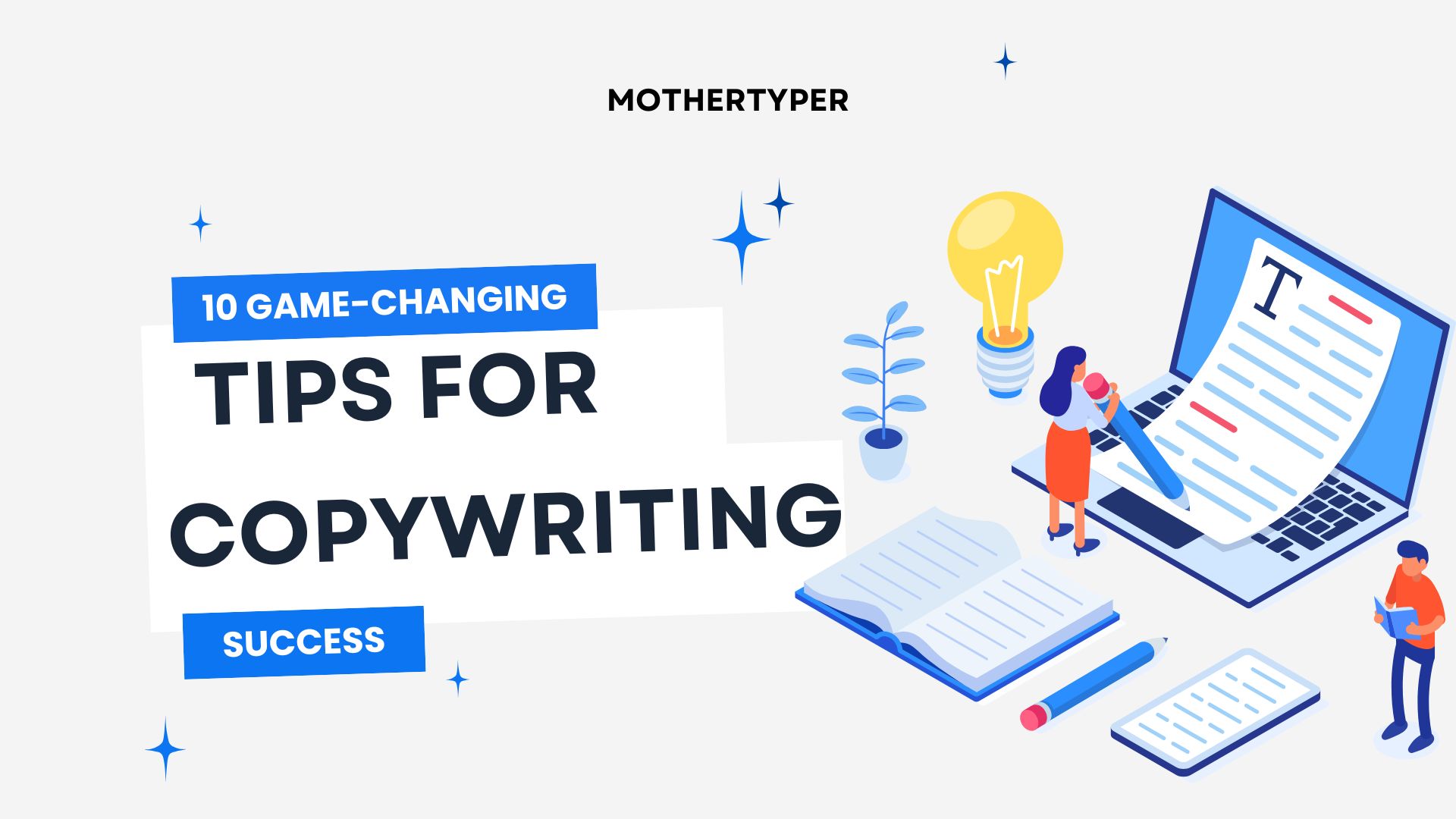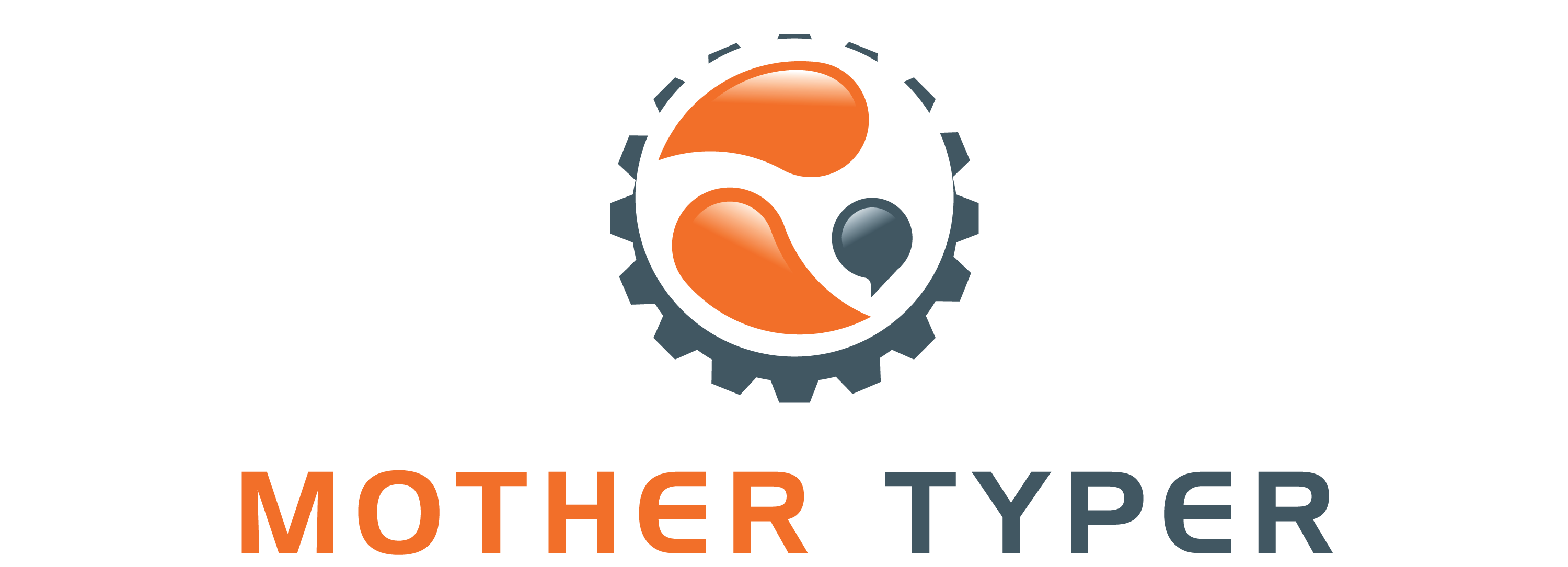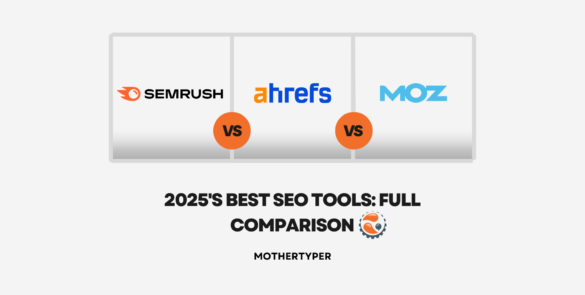What is Copywriting + 10 Game-Changing Tips you NEED to Know

What do great marketing campaigns all have in common? Persuasive words. It can really drive action, boost sales, and, more importantly, build your brand.
Here, you can find out what is copywriting, how it works, why you need a copywriter for your business, and what to consider when hiring. But that’s not all. Did you know that you can copy write yourself? Hand to digital marketing.
This piece also takes you through how to become a copywriter, whether it’s worth it, and who hires these writers.
Table of Contents
MotherTyperCopywriting Meaning
The copywriting definition is quite simple. Have you ever searched for something on the web and quickly clicked on an article because of a catchy headline like “How to Transform Your Business in 30 Days”? That’s the power of copywriting. It’s content that speaks to users. It’s not just headlines - it can be a compelling ad, website copy, social media content, sales pages, etc. The list goes on!
| Type of Copywriting | Example | Purpose |
|---|---|---|
| Headlines and Taglines | “Unlock Your Full Potential in Just 30 Days” | These are short and catchy phrases that grab attention, making people want to read it. |
| Advertisements | “Shop Now and Get 20% Off Your First Order” | Concise yet persuasive texts designed to promote a product or service and prompt immediate action. |
| Website Copy | Homepage: “Transform the way you work with tools built to save time and money.” | Includes concise headlines, CTAs, and detailed sections to guide users through a website journey. |
| Social Media Posts | “Want to lose weight fast? Try our new program today! #HealthyLiving” | Short but impactful, engaging users and directing them toward a product or website. |
| Sales Pages | “Discover the secrets to financial freedom. Our 10-step guide will change your life – click below to learn more!” | Long-form persuasive content designed to educate, build trust, and drive conversions. |
| Product Descriptions | “The UltraSoft Pillow is engineered for maximum comfort, with memory foam that adapts to your sleep style.” | Highlights features and benefits effectively, with text length adjusted for the platform. |
| Articles or Blog Posts | “How to Transform Your Marketing Strategy in 5 Steps: A Beginner’s Guide to Copywriting” | Longer-form content that educates while subtly encouraging action (e.g., subscribing or buying). |
Copy vs. Content Writing
Copywriting is about swaying someone’s mind, while content writing is more about informing and educating people. In some industries, the benefits of copywriting exceed those of content writing, but content writing can be pretty helpful, too. It’s just a matter of the type of business, the goals it wants to achieve, and the audience it serves. The industries that rely more on copywriting include e-commerce, real estate, and SaaS (Software as a Service).
How Does Copywriting Work?
Well, it’s not just emotion – it also has a lot to do with human psychology. This is what digital marketers and writers like to call copywriting techniques. They make your copy persuasive, relatable, and effective [Park University].
Emotional Triggers
Copy that appeals to emotions like happiness, fear, or excitement creates a strong connection. There’s a thing where people often make decisions based on their emotions and then rationalize them with logic. For example, someone notices a dress in the window of a shop and is instantly in love. They go into the store and see that it’s quite expensive. That emotional feeling soon turns into their brain saying or rather screaming “yes”. But humans have to convince themselves of something before that final push, which usually sounds like “it’s such a good investment” or “you’ll never find something like this again”. The reality is that they don’t need the dress, shoes, new phone, or anything else that grabs their attention.
Here are 3 copies and their emotional effect:
- Fear of Missing Out (FOMO): A CTA that says, “Only 3 left in stock – order now!” taps into the fear of missing out. So, they compel people to act quickly.
- Desire for Happiness or Comfort: A phrase like “Imagine waking up stress-free every morning” sparks a positive feeling, which makes the offer more appealing.
- Curiosity: Headlines that read “You Won’t Believe What Happened Next!” makes readers want to know more.
Social Proof
Humans want guidance, but most of the time, the question is, “Who do I trust?”. This is where social proof comes in - it’s very important. They show others you know what you are talking about and are trusted.
Here’s examples of social proof:
- Testimonials and Reviews: Add copy like “Loved by 1,000+ happy customers” to your products. They build trust!
- Case Studies: Sharing personal stories is a great way to show people what’s possible.
- Popularity Signals: Include statements throughout content such as “Our best-selling product” or “Most recommended by professionals”. They reassure readers that they can trust the brand because others are.
Reciprocity
Has someone ever given you something of value, and you felt the need to give back to them somehow? That’s human. So, if a business offers a free eBook, webinar, or trial, it makes users feel compelled to engage further. This can be signup up or purchasing a product! Another way to do this is by writing education posts or guides. This creates a sense of gratitude, which increases the chances of customer loyalty.
Scarcity and Urgency
How do you get people to value things more? Make it rare or limited. It urges them to take immediate action.
Here are two ways of doing it:
- Limited Time Offers: “Sale ends at midnight”
- Exclusive Acess: “Available to our subscribers”
Authority and Credibility
People are more likely to trust and act on something if they consider you an expert or authority figure [The Decision Lab]. For example, would you trust someone who says, “You should use this product because it has great benefits” or “Leading dermatologists have recommended this product”? The change isn’t that big but the impact is. You can add certifications and awards by adding phrases like “ISO-certified” and “Winner of the Best Product Award”. They tell users that they can trust you. But don’t leave data and statistics out of this technique - they provide concrete proof of a claim.
Data and statistics examples:
- “90% of users saw results in just two weeks.”
- “By switching to our services, businesses have saved an average of R8,000 a month.”
- “Our product has a 99.9% uptime, which ensures that your operations run smoothly without disruptions.”
The Power of Simplicity
People prefer easy decisions. So, what does that mean? No overly complicated language or information. Messages need to be straight to the point, choices should be broken down, and chunky information should be turned into short paragraphs or listed items by using bullet points.
Storytelling
Stories are kind of hardwired into the brain. They create emotional engagement while making the messages more memorable.
For example:
- “Meet Nicky, a busy mom who struggled with meal prep until she found our app…” This relatable scenario helps readers see themselves in the story.
- “We were on the brink of closing our doors until…” When you share challenges and how you overcome them, it makes the message more compelling.
- “Picture yourself sipping a cocktail or mocktail on a sunny beach.” This helps readers to imagine the benefits.
The Principle of Consistency
When people commit to something, they are more likely to follow through. This might come as a surprise, but it doesn’t have to be something big. It can include something like signing up for a free trial or answering a few questions in a survey.
Personalization
Sometimes, users just want to feel understood and seen. How do you do that? Start off by using their names in emails so that it feels more personal. Write copy for different demographics to ensure both relevance and connection. Address their pain points directly by showing that you understand a problem, for instance, “Tired of struggling with…”. This makes readers feel seen and valued.
The Zeigarnik Effect
This effect suggests that people remember incomplete tasks better than complete ones [Learning Loop]. Copywriters often use this technique when writing to spark curiosity and engage follow-through.
It looks like this:
- “And that’s just the beginning…”
- “Think ads don’t work anymore? See how one headline skyrocketed engagement by 200% – and how you can do it too.”
Benefits of Copywriting for Business
Content copywriting has transformed thousands and thousands of businesses over the years, which makes this an absolute must. The right person or writing company can mean higher conversion rates, more customer engagement, stronger SEO, better return on investment, and more. Your bounce rate can lower by as much as 42%. Isn’t that just crazy? Each of these is explained below in detail – let’s take a look.
Here’s how a copywriter can help your businesses:

-
It increases conversions:
A good copywriter knows how to create words that sell because they understand what makes people take action. This means you could double your sales by changing how your messages are presented. -
Helps you build a strong brand voice:
A voice you can call your own. These writers not only craft a unique voice but ensure brand consistency, which has been shown to build trust and make your brand memorable to customers. -
Creates visibility:
It’s not all just pretty words – it’s also about weaving the right keywords into your content so that you rank higher on search engines. The more visibility means more potential costumes. -
Improves customer connection:
Copywriters know how to speak to target audiences. This taps into customers’ emotions, needs, and pain points – everything you need for your product or service to sell. -
Makes you stand out from competitors:
It’s like everyone is fighting for attention online, but you won’t have to worry about that. Copywriters can make your business stand out with unique, engaging, and persuasive messaging. -
Boost your ROI (return on investment):
Copywriting is really an investment if you think about it because it directly contributes to the growth and success of your business. When it’s done right, it can attract the right audience, keep them engaged, and motivate them to take action.
Why Hire a Copywriter

Running a business is demanding, and throwing writing copy into the mix can leave little time for your business affairs. The solution? Business copywriters. They can save you both time and effort. Just type “I need a copywriter” into your search bar whether you are using LinkedIn, Google, or any other search engine. You’ll quickly get a list of freelancers or businesses that want to work with you.
What to Consider when Hiring a Copywriter
Hiring a copywriter can greatly benefit your business, but much of the success depends on the writer and the agency you choose.
Here is what you should consider:
- Experience and Expertise: Does the writer have experience in your specific industry? A background ensures that they have an understanding of the target audience and market trends.
- Portfolio and Writing Samples: View their portfolios and look for writing style, tone, and versatility. This will help you get an idea of if they would work well with your business.
- Understanding of SEO and Marketing Principles: Make sure that the writer has a grasp of SEO if you need online content. But that’s not all. They also need to understand persuasive techniques, audience targeting, and calls to action.
- Adaptability and Voice: Can they adapt their tone and style to match your brand? This is a very important question to ask because some businesses might prefer a professional tone, while others would be more satisfied with a conversational tone.
- Communication Skills: This is essential for a smooth collaboration. So, assess their ability to understand your goals, ask questions, and provide updates throughout the task. Sometimes, this means that you have to run a trail run.
- Creativity and Problem-Solving: Original ideas are what sets brands apart. Look for creativity in their samples or even interviews.
- References and Testimonials: To ensure that they provide quality work and on time, talk to their previous clients. They are usually listed in the CV but you can just ask them for a list before proceeding.
- Availability: If you are offering a long-term role, ask them about their availability for ongoing work.
- Budget: Are their rates aligned with your budget? You have to keep in mind that high-quality copywriting can be pretty expensive.
How to Copy Write Yourself

You learned about what is a copywriter and what they do, but did you know that you can do it too? Believe it or not, it’s true [Nelville Medhora on Medium]. It’s not this exclusive skill reserved for professionals with years of experience. With dedication, some practice, and the right techniques, you can learn how to write messages that sell.
Here are some tips to help you get started with copywriting:
1. Understand Your Audience
Who are you writing for? You need to understand their needs, pain points, and desires. The best way to do this is to ask yourself what problem you will be solving and for who exactly. Is it, frustrated men or bored teenagers? The better you understand your audience, the more effective and relatable your copy will be.
2. Define the Goal of Your Copy
It’s important that every piece has a clear purpose. For example, sell a product, drive traffic, or build brand awareness. This guides you to craft the tone, structure, and content of your writing.
3. Learn the Basics of Persuasive Writing
Copywriting isn’t just about the information that you are giving the reader but also about persuasion. So, learn about using emotional triggers, creating a sense of urgency, and crafting strong calls to action. This is what turns a good copy into a great copy!
There are plenty of resources and courses available on the web to help you with these techniques. You can also get an internship where an experienced copywriter takes you through everything and gives you pieces to work on. They normally leave comments and ask you to edit the piece according to their input.
4. Practice Writing Headlines
Headlines are usually the first thing people see, so they need to grab attention. Practice this task until you feel like you understand how to do it. Here’s a tip: headlines usually highlight a benefit, solve a problem, or spark curiosity. Use that as your basis!
5. Keep It Simple and Clear
You don’t want to use overly complex language or any jargon in your copy – they leave users confused and unsure, which is the opposite of what businesses want. Write your messages so they are easy for anyone to understand, whether they are an experienced professional in the field or a newbie trying to learn.
The text needs to be scannable and easy to read. How do you do that? By using short sentences, multiple paragraphs, and bullet points.
6. Focus on Benefits, Not Just Features
You need to discuss the benefits of a product or service instead of just listing features. For instance, don’t say that this software has a scheduling feature. Instead, say, “This software saves you hours by automating your schedule.”.
This honestly takes time to learn, but once you get the hang of it, you kind of think that way and can just put it on paper.
7. Edit and Refine Your Copy
The first draft isn’t usually the piece you submit, and for good reason: it needs editing. Once you have written your piece, read it through and make sure everything sounds natural. If it’s a longer piece, the different sections work well together as a whole, and, most importantly, you aren’t repeating certain information.
Your best friend should be a grammar and spell-checking tool during these tasks. They save you so much time throughout the process. They show you where improvements are needed, and you can just simply click for the changes to be implemented, for Grammarly at least.
Is Copywriting Worth It?
Writing copy is considered one of the most valuable skills to have today. So many people are looking for jobs online, which means that some markets are over-saturated. But there is more than enough space in the copywriter business for you.
It can open so many doors that you didn’t even know existed, whether you pursue it as your full-time job or side hustle.
Who Hires Copywriters?

Copywriters are in high demand across a wide range of industries. Companies of all sizes, from startups to large corporations, hire copywriters to craft content for websites, advertisements, email campaigns, and social media.
Here’s a list to break it down for you:
- Small Business Owners: Local shops, cafes, or service providers that need help with marketing materials like brochures, websites, or social media.
- Startups: New companies looking to establish their brand and create engaging content for their launch.
- E-commerce Businesses: Online stores that need product descriptions, email campaigns, or ad copy to increase sales.
- Marketing Agencies: Agencies that handle multiple clients and need extra help with content creation.
- Non-Profits: Organizations that require compelling donation appeals, newsletters, or awareness campaigns.
- Freelancers and Solopreneurs: Coaches, consultants, or personal trainers building their personal brand or marketing their services.
- Bloggers and Influencers: Content creators who need help writing captions, blogs, or sponsored posts.
- Real Estate Agents: Professionals who want property descriptions, ad copy, or email newsletters for their agency.
- Healthcare Providers: Clinics, dentists, or therapists that need clear and engaging copy for patient outreach.
- Tech Companies: Businesses in need of website copy, app descriptions, or user guides.
- Event Planners: Organizations or individuals promoting events, needing press releases, email invites, or ads.
- Online Course Creators: Educators or experts selling courses who need landing pages, sales copy, or email funnels.
- Local Non-Tech Businesses: Tradespeople (plumbers, electricians) who want simple yet effective website copy or flyers.
- Tourism and Hospitality: Hotels, travel agencies, or Airbnb hosts need engaging descriptions and promotional content.
- Fitness Studios and Gyms: Health clubs that need content for promotions, social media, or email outreach.
Conclusion: Copywriting Def, Importance and Opportunities
What does writing copy mean exactly? It’s about crafting a message that urges users to take action. The secret is technique – choosing the right words, addressing the audience’s needs, and presenting a compelling call to action.
But is it really that necessary? The benefits of hiring a copywriter are undeniable. For instance, it can create brand awareness and boost sales, making it the backbone of every successful marketing campaign. So, yes, it’s necessary!
Need a copywriter? MotherTyper has just the team for you. It’s time to get your services or products noticed – we can bring your ideas alive and grow your business at the same time. Just click here!
How do I know if I am one of the businesses that need copywriters?
Companies that need copywriters often have products, services, or ideas to promote but not the time, expertise, or resources to write compelling messages themselves. If your business struggles to attract, engage, convert, or clearly communicate your value - it’s an indication that you need a copywriter.
Why is copywriting important in marketing?
This is probably one of the most asked questions, alongside “What is copywriting in marketing? The answer is simple: copywriting is the backbone of all successful marketing efforts. Some even go as far as saying that without compelling copy, the best products or services could easily go unnoticed.
Can I become a copywriter for businesses without a qualification?
The truth is that you don’t need a qualification to become one. A degree or formal training can be helpful, but it is not a requirement for success in the field. What matters is your ability to write content that compels and engages users.
You can build this skill by practicing, reading, and studying examples of effective copy. Also, be sure to set up a portfolio, as it shows businesses what you are able to do far more than a qualification.
Introducing Our Success Stories
We take pride in delivering exceptional results for our clients! From boosting website traffic and improving search rankings to driving meaningful engagement, our tailored strategies have consistently exceeded expectations. Below are some of our most successful achievements that showcase the power of effective SEO and digital marketing. Let these results inspire what we can achieve together!

Pia Vosloo
CEO | Founder of MotherTyper





 Ahrefs vs Moz vs SEMrush (2025) | Best SEO Tool Comparison
Ahrefs vs Moz vs SEMrush (2025) | Best SEO Tool Comparison